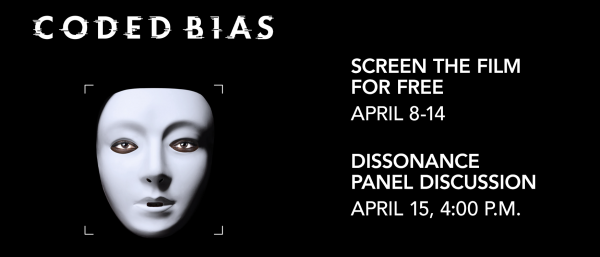
You are invited to a free, on-demand screening of the documentary film Coded Bias—available anytime from April 8 to 14 and a panel discussion of the film April 15. Coded Bias explores the fallout from an MIT Media Lab researcher’s discovery that facial recognition does not identify dark-skinned faces and women’s faces accurately. The film follows her journey to push for the first legislation in the U.S. to govern against bias in the algorithms.
Automated decision making has the unprecedented power to disseminate bias at scale. The artificial intelligence (AI) algorithms that power facial recognition and other software already often decide who gets hired, who gets health care, who gets home loans, and who gets undue police scrutiny. Coded Bias tells the story of mathematicians and data scientists who are leading the fight for ethical use of the technologies of the future.
Thursday, April 8 through Wednesday, April 14, watch Coded Bias online at Virtual Screening for the University of Michigan. You will need the Coded Bias watch password (UMVIEW21) to access the movie.
Following the film event, on Thursday, April 15, 4:00–5:00 p.m. EST, join a panel of U-M faculty members over Zoom for an “At the Movies” style discussion of the film and the challenges presented by technologies that reflect the systemic biases in American society. Panelists include:
- Nazanin Andalibi, assistant professor of information, School of Information; assistant professor of Digital Studies Institute, College of Literature, Science, and the Arts (LSA)
- Mingyan Liu, Peter and Evelyn Fuss chair of electrical and computer engineering, Electrical Engineering and Computer Science (EECS)
- Nicholson Price, professor of law, Law School
- Grace Trinidad (moderator), Ethics, Legal, and Social Implications (ELSI) postdoctoral fellow, School of Public Health
Access to Coded Bias and the panel discussion are brought to you by the Dissonance Event Series, ITS Information Assurance, the U-M School of Information, and the Law School’s Privacy and Technology Law Association.
